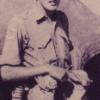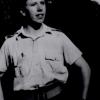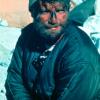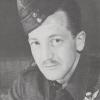COLONEL ALASTAIR PEARSON joined the 2nd Parachute Battalion from the HLI in September, 1941. He acted as Second-in-Command for a short period before taking over a company in the 1st Battalion. Throughout most of 1942 he prepared it thoroughly for war, till later in the year he became Second-in-Command and as such he sailed with the Battalion for Algiers and the North African Campaign.
The 1st Battalion went into action early in November, 1942, and played a most important part in pressing the Germans back towards Tunis and in rallying the French Army to our cause. During these operations, the Commanding Officer, James Hill, was seriously wounded and Alastair Pearson took over. Even for those days, at the age of 26, he was very young to be a Commanding Officer, but he nevertheless immediately stamped his personality on the 1st Battalion and led it throughout the campaign with outstanding success.
He soon showed that he was a very gifted soldier who had a flair for making the right decisions and had the determination to see these decisions carried out. Without being in the least bit unsympathetic for his soldiers, he was always looking for opportunities to bring them into action, at the same time making certain that they were never committed to unsound tasks.
He never spared himself, and when he had both his hands very badly burned through an accident with a petrol stove, he remained at his Headquarters in considerable pain and discomfort, his batman having to look after him throughout.
Perhaps the greatest battle fought by the 1st Battalion was the attempt to capture Djebel Mansour. This huge feature dominated a vital sector in the North African front and all concerned realised that its capture would greatly delay the impending enemy offensive.There is no space here to describe this battle; Grenadier Guards, Lothian and Border Horse
and French Foreign Legion were co-operating with the 1st Battalion, but it was almost entirely due to Alastair's planning and leadership that the battle was nearly won. No one who took part in it will ever forget his efforts, tirelessness and fearlessness at the time. Though the outcome was failure it was one of the most glorious in the history of our Regiment.
After this the Battalion was in a quiet sector for a while and this allowed Alastair to absorb reinforcements and get them back to form in a very short time. They played their part in a counter-attack in the Bou Arada sector with their usual elan and soon after moved up to the northern sector for what was to be a very prolonged and costly ordeal.
By the middle of February, 1943, the enemy, who had been reinforced by much of the Africa Corps, had attacked all along the Allied lines. In several places they had nearly broken through and in some they had established large salients.They had, however, eventually, been checked everywhere except in the most northerly sector along the road from Bizerta to Bone. Up here the Germans had concentrated a division and had overwhelmed an under-strength British Brigade and if they could continue to advance they might be able to cut off the 1st Army from the sea.
The 1st Battalion had to bear the brunt of the initial enemy thrust. They did so to good effect and it was here that Alastair showed his complete contempt for danger and a determination never to give up. When the enemy penetrated his forward Companies and threatened his Battalion Headquarters, without calling for help from elsewhere he immediately counter-attacked with his Headquarters and restored the position. By such means they held on for several days of continuous enemy attack. It was here that he again demonstrated his tactical ability for when a most difficult feature, which was known as Bowler Hat, had to be captured, he succeeded with infinitesimal casualties where others had completely failed. During the opening phases of the 1st Army offensive in which the 1st Parachute Brigade had to strike the first blow, he, having captured a complete regiment of Bersagilieri took his Battalion right round the main enemy position and made it inevitable that the Brigade's plan succeeded.
His next outstanding feat was in the battle for Primasole Bridge in Sicily when, after watching an infantry battalion fail in a full-scale daylight assault, he volunteered to lead another battalion across the river to capture the bridge at night. This he did, having fought with his own seriously depleted Battalion continuously for 48 hours. Needless to say, the battalion he guided succeeded in capturing the objective with very few casualties. Once again he showed that he had an exceptional flair for seeing the enemy's weak points and knowing exactly how to make the best use of this weakness.
After Sicily he himself was laid low with malaria and other ailments this is not surprising after what he had been through, and when he finally had to hand over the 1st Battalion to Peter Cleasby-Thompson, we all felt that something rather tremendoushad gone out of our Brigade.
After recovering he assumed command of the 8th Battalion and got busy preparing it for the Normandy invasion of June, 1944. He quickly showed that he had lost none of his old skill and cunning, nor any of his other most enviable characteristics. So many members of the Regiment well know the story of his exploits in Normandy that they require no further description here. Let it just be said that through his efforts he made a solid contribution to the build-up of the great name of our Regiment.
After Normandy old ailments made it necessary for him to give up command of a field force unit, and he took command of a training battalion in the U.K. Anyone who had thought of him as being only a battle soldier soon realised that he was a most capable administrator as well, and all those who left his Battalion for one of the divisions arrived knowing full well what was expected of them.
As soon as he was demobilised in 1947 he set about the task of raising the 15th (Scottish) Battalion, and in a very short time a most formidable, thriving unit was to be seen in the City of Glasgow. He laid the foundations really well and truly and this Battalion is still one of the most flourishing in the Territorial Army.
After relinquishing command he moved to Brigade Headquarters where he served for six years as training Colonel and Deputy Commander. His advice on TA matters and in training generally was of tremendous assistance to his Brigade Commanders. During the summer camps he was as ever, indefatigable, and as a chief umpire he was without peer. All who took part in the Brigade exercises will remember the rather shaggy figure, always in shirt sleeve order whatever the weather might be, driving himself in a Champ with great aplomb and skill from one scene of action to another.
Few regiments can have had an officer who won more awards which were so richly deserved - an MC was soon joined by four DSOs, then the OBE and finally the CB.In addition to these military distinctions he was an ADC to the Queen and is a Deputy-Lieutenant in his home county of Dumbartonshire.
More than anybody we know, Alastair personified the early volunteer parachutist. He had all the qualities a parachute soldier needs and as long as our Regiment exists, he will be the Star.
JDF
Reproduced from the Pegasus Journal Vol XVI No 4 January 1962
Read More




Latest Comments
There are currently no comments for this content.
Add Comment
In order to add comments you must be registered with ParaData.
If you are currently a ParaData member please login.
If you are not currently a ParaData member but wish to get involved please register.